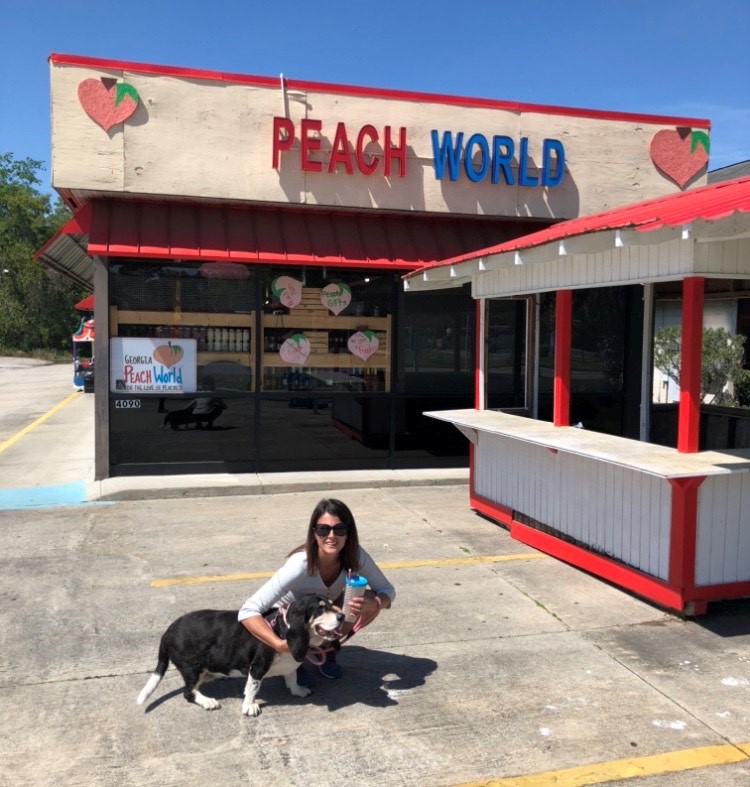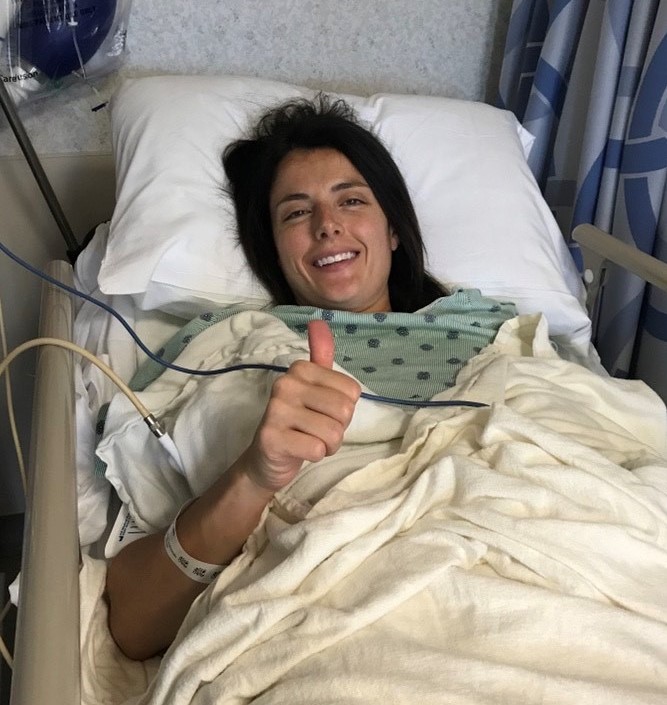
The Legacy
April 11, 2024
This is a guest post by Christopher Wood, Jr, son of the KCA’s late Board Chair and friend, Dr. Christopher…
Read More
In this three-part series, guest writer Megan Conley describes her experience with kidney cancer. Megan is a featured speaker at the KCA’s upcoming IKCS 2020 and Virtual Patient Symposium (register now).
Read part two – “How much we take for granted.”
Read part three – “Life after kidney cancer will be different.”

My husband and I got married in April 2019 and in the fall of that year, we were ready to start our family, but experienced some complications. My kidney tumor, like for many kidney cancer patients, was incidentally found, during a series of ultrasounds for fertility issues. After months of tests, including a CT scan, MRI, and biopsy, I was diagnosed with chromophobe renal cell carcinoma. My diagnosis came as a shock and fast-tracked our vows “in sickness and in health.” I went from being excited about this next chapter in my life to secretly wondering ‘am I going to die?’
This emotional journey really began before I received “the call.” An ultrasound detected a 4.2 cm mass in my kidney in November 2019 that was initially identified as a common benign mass of the kidney called an angiomyolipoma (AML). I did some research and determined it was not something I needed to be concerned with, except that there was a risk it could rupture and that risk could increase with pregnancy hormones. Still thinking my husband and my focus would be on getting pregnant, I made an appointment with a urologist to get more information.
Because I was young, healthy and asymptomatic, the urologist was fairly confident it was an AML but ordered a CT scan because of my concerns about the mass rupturing. I had my scan on Christmas Eve and at this point cancer was not even a thought in my mind – I just wanted to know what needed to be done so we could proceed with trying to get pregnant.
A week later, I met with the urologist again, excited to finally have a definitive answer. He said the mass was not an AML but likely a cyst. Again, he was not overly concerned because I did not fit the clinical profile of a kidney cancer patient, but suggested I have an MRI to get confirmation on what the cyst was filled with. I left my appointment with more questions than answers. Could the mass be something more serious? This was the beginning of what would be two months of a heavy weight on my shoulders filled with a lot of “what if” questions and scenarios – I became obsessed.
“I am sorry this is not the call you were expecting… “
The results of the MRI were in and I received the memorable call on January 30, 2020:
“I am sorry this is not the call you were expecting, but it turns out your mass is a cancerous tumor.”
The radiologist identified my tumor, located deep in my collecting system, as either papillary renal cell carcinoma or a translocation tumor. The uncertainty left me with a sliding scale of “what if” scenarios and a lot of anxiety. A part of me thought this could all be a mistake because I felt completely healthy. The urologist said a biopsy meant risking a false negative and that it was better to proceed with surgery since I was young, even though he could not give me a definitive answer about the type of surgery I would need.
During my research I read an article on the Cleveland Clinic website about a woman in her thirties who was diagnosed with kidney cancer while she was pregnant. My biggest takeaway from her story was to “take a step back and don’t rush decisions.” Taking the time to get a second opinion conflicted with my desire to remove the cancer from my body as soon as possible, but it was worth it. On February 14, 2020, I traveled to Washington, D.C. from my home in Florida to see a recommended urologist at a hospital that I was familiar with, having recently lived in the D.C.
Based on my discussion with the urologist in Florida, I assumed the new urologist would want to immediately schedule surgery. To my surprise, the urologist recommended a biopsy. His reasoning for a biopsy made complete sense. One, there was a 5-10% chance that my mass was a fat-poor AML which can be misdiagnosed as cancer based on imaging alone and the urologist did not want to partially or completely remove my kidney if the mass was in fact benign. Two, if it was cancer, he wanted to know exactly what type to determine the best way to proceed with my treatment and minimize any risk. I asked about the risk of a false negative and he informed me the pathology report would come back as benign, undetermined, or cancerous, the latter two requiring surgery. At the time, I was disappointed because having a biopsy meant more waiting, but I reminded myself of the article and the importance of taking the extra steps.


Two weeks later on February 27, 2020, I had my renal biopsy and a week later I received a call confirming that my tumor was cancer, but that it was chromophobe renal cell carcinoma, a type of cancer that was not previously mentioned to me. The urologist explained that I would need to have the tumor surgically removed, but that this type of cancer had a favorable prognosis when caught early and contained in the kidney.
Without pursuing a second opinion which led to a biopsy, my diagnosis up to this point was not accurate. As someone that did not fit the clinical profile of a kidney cancer patient, the biopsy informed the urologist of a type of cancer that would not have been diagnosed without surgery. This led to an informed decision on my treatment plan, which is why the urologist felt confident attempting a partial nephrectomy involving a less invasive robotic surgery and shorter recovery time.
As crazy as it sounds, I felt relieved after I received the biopsy pathology report and had a solid answer as to what my mass was. The uncertainty surrounding my diagnosis was gone – I felt a sense of control because I knew what it was and what needed to be done to get it out.
Lessons Learned
Disclaimer: This was my experience as a kidney cancer patient and not a medical professional. I have included some insights that I wish I would have known before navigating the healthcare system with a cancer diagnosis. I hope other kidney cancer patients find these insights helpful.
1 thought on “For Megan Conley, an Unexpected Diagnosis (Part One)”
Hi Megan
Thank you for sharing and laying out your journey for me and for others. Your so right, you need to always be your own advocate, doctors are people and you just need to follow your gut / instinct because they don’t know sometimes.
Second opinions are a MUST!!! Great advise to share. You are an amazing beautiful person and it looks like you are weaving your way back to a solid path of good health. Thinking of you , please keep me updated. Take care Your friend Luann